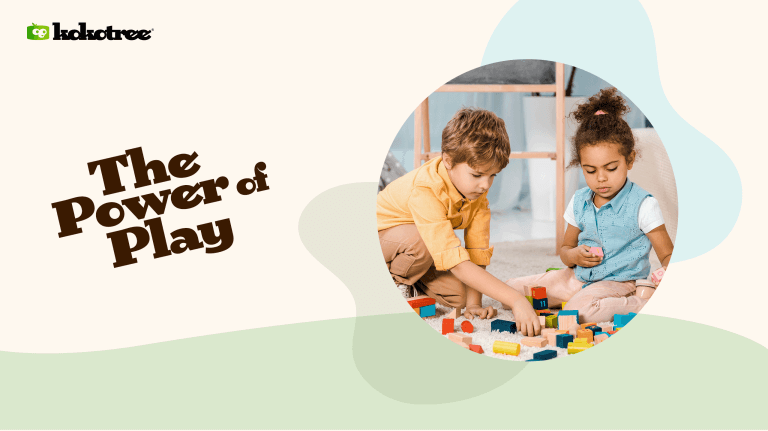

Written by: Kokotree
Updated:

Play is an essential part of early childhood development. Through play, children learn, grow, and develop the skills they need to thrive in school and life.
In this article, we will explore the role of play in supporting children’s physical, cognitive, emotional, and social development and the benefits of play in promoting creativity, problem-solving, and critical thinking skills.
We will also discuss the role of parents in supporting and facilitating their child’s play, different types of play, and how to incorporate them into your child’s routine.
Finally, we will explore the benefits of outdoor play and nature in supporting your child’s development, the potential drawbacks of excessive screen time, and how to balance it with play.
Play is essential for children’s overall growth and development. It supports the development of their physical, cognitive, emotional, and social skills.
Children can move, explore, and discover the world through play. This physical play helps to develop their gross and fine motor skills, coordination, and balance.
Cognitive play, such as problem-solving and pretending, helps to develop children’s critical thinking and problem-solving skills.
Emotional play, such as role-playing and pretending, allows children to express and understand their emotions and build empathy and social skills.
Social play, such as cooperative and imaginative play, helps children learn how to interact with others and develop communication skills.
Play is a powerful tool for promoting creativity, problem-solving, and critical thinking skills in children.
Children can explore, experiment, imagine, create, problem-solve, and think critically through play. This type of play helps children develop their creativity, ability to think outside the box, and critical thinking skills.
Parents play a crucial role in supporting and facilitating their child’s play during the preschool years.
Parents can help their child’s development and learn by providing a safe and supportive environment, offering a variety of play materials and resources, and engaging in play with their child.

Get free parenting tips, news, updates, and content from Kokotree.
Children can engage in many different types of play, and each class supports various aspects of their development.
Some examples of different types of play include physical play, cognitive play, emotional play, social play, and imaginative play.
To incorporate these different types of play into your child’s routine:
Outdoor play and nature have many benefits for children’s development. Outdoor play allows children to engage in physical activity and explore the natural world.
It also provides opportunities for children to develop their gross and fine motor skills, coordination, and balance.
Nature offers a rich and stimulating environment for children to learn and grow, and it can also promote creativity, curiosity, and imagination.
Excessive screen time can have adverse effects on children’s development. It can limit their physical activity, reduce social interaction, and hinder cognitive development.
To balance screen time with play, it’s important to limit screen time and encourage other forms of play and activity.
This can include providing various play materials and resources, engaging with your child, and encouraging outdoor play and nature exploration.
Play is vital for children’s development during the early years. It plays a crucial role in supporting their transition to school and beyond.
The skills children develop through play, such as problem-solving, critical thinking, creativity, and social skills, are essential for success in school and life.
By supporting and facilitating their child’s play, parents can help them to develop these skills and prepare them for the challenges of school and beyond.
In conclusion, play is an essential part of early childhood development. It supports the development of children’s physical, cognitive, emotional, and social skills and promotes creativity, problem-solving, and critical thinking.
As parents, we play a crucial role in supporting and facilitating our child’s play by providing a safe and supportive environment, offering a variety of play materials and resources, and engaging in play with our child.
By supporting our child’s play, we can help them develop the skills they need to thrive in school and life.



